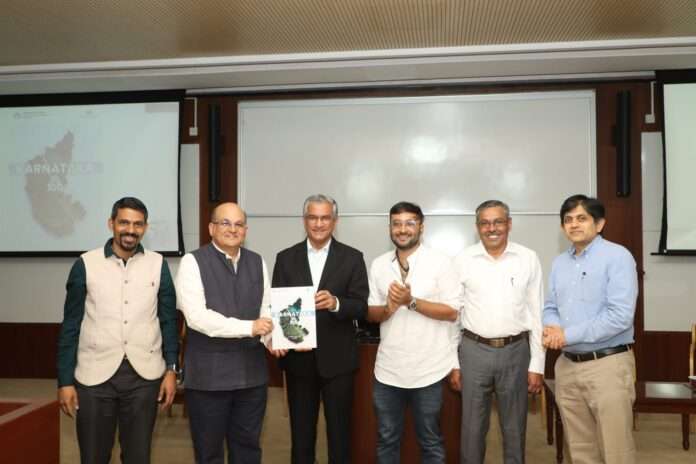Report emphasizes decentralisation, investment in primary education, healthcare and R&D, green ecosystem building and development beyond Bengaluru
Bengaluru, 13 JUNE, 2023: Indian Institute of Management Bangalore (IIMB) and Confederation of Indian Industry (CII) released ‘Karnataka@100: A Vision Document for 2047’, at the IIMB campus, this morning. The report was released by IIMB Director Prof. Rishikesha T Krishnan and Mr Ramesh Ramadurai, Managing Director, 3M India Ltd, and former Chairman, CII Karnataka State Council.
Mr Ramdurai said, “This is a great milestone – personally and professionally. I last came to the IIMB campus, 39 years ago, as a student participating in an inter-IIM business plan contest! It’s great to be back on this wonderful campus. Professionally, this document is an initiative of CII – India@2047 – as an over-arching vision for the country. Any visioning exercise is a guidepost. The specifics will come as we progress on these journeys and we will calibrate and revise as we go on. We have many interesting themes in this document and it rests on pillars of sustainability and innovation.”
ALSO READ: Wonderla Celebrates Father’s Day with a Spectacular Buy 2 tickets and Get 1 Free offer.
The Vision Document , Karnataka@100, has been co-authored by Prof. Jitamitra Desai, faculty, Decision Sciences; Prof. Prateek Raj, faculty, Strategy; Prof. Anil B Suraj, faculty, Public Policy; and Prof. Shanker Subramoney, Finance & Accounting. Contributors include Prof. Rishikesha T Krishnan, Director, IIM Bangalore and faculty of Strategy; Prof. Arnab Mukherji, faculty, Public Policy; Prof. Trilochan Sastry, faculty, Decision Sciences; Prof. R Srinivasan, faculty, Strategy, and Dayasindhu N, Co-founder and CEO, itihaasa Research and Digital, and alumnus of IIMB’s Doctoral programme.
In his welcome address, IIMB Director Prof. RT Krishnan said: “The Karnataka@100 Vision document shall serve as a compass, guiding our journey towards a future where Karnataka stands as a beacon of equitable and sustainable growth for the world. The vision document emphasizes sustainability and innovation as two key pillars for the balanced and inclusive growth of Karnataka. It is an invitation to all stakeholders of Karnataka from citizens to policymakers, from academia to the business community, to join hands and come together to build a green ecosystem in Karnataka, that shall put our state at the frontier of the global economy.”
From his time spent working on the 2008 Vision document, Prof. RT Krishnan said: “The youth was so particular and concerned about the environment and ecological degradation. They were prescient. Also, the heterogeneity of Karnataka’s development remains as it was in 2008. Bangalore Urban alone accounts for 37 per cent of the Gross State Domestic Product. The Govt. has recognized this, and it remains a priority to address this heterogeneity. Karnataka, and Bengaluru, in particular, have evolved as forerunners in innovation. There is a tremendous opportunity to build on this strength.”
Prof. RT Krishnan expressed gratitude to the faculty members of IIM Bangalore and the Confederation of Indian Industry for their contributions to the vision document. “I hope it serves as a catalyst for fruitful conversations and action towards a more prosperous, equitable, and sustainable Karnataka.”
Prof. Jitamitra Desai observed that Karnataka has shown extraordinary socio-economic progress since India’s independence in 1947, and even more so since the liberalization of the Indian economy in 1991. “From coffee to IT Karnataka has made a distinct name for itself on the global map. However, lofty economic growth has also brought to the state its fair share of unique challenges. Karnataka’s economic engine has not been geographically balanced, and its economic growth, notably in the 21st century, has also come with multitudes of sustainability and climate change challenges that contemporary rich countries have never experienced,” he explained.
 Online Courses with Certification
Online Courses with Certification
“We believe that in the 21st century, Karnataka must utilize its strengths in innovation, entrepreneurship, biodiversity and heritage, to trailblaze an uncharted path of equitable and harmonious growth fuelled by a green ecosystem at its core, which will become a benchmark not just for India, but for the entire world, especially the Global South. We strongly believe that Karnataka is uniquely positioned to undertake such global leadership today,” said Prof. Prateek Raj.
In his address, Prof. Anil B Suraj said: “We have worked on 14 themes in this document. For instance, Karnataka was the first state in the country to implement Panchayat Raj and we have highlighted various aspects of governance in this report. We have, obviously, looked beyond Bengaluru while looking at balanced growth.”
Prof. Shanker Subramoney, from the Finance & Accounting area at IIMB, said: “We need to show the world that there is more to Karnataka than Bengaluru. For the report, I focused on the Manufacturing sector, and in our conversations with stakeholders in the sector, we saw the need for more decentralization and transparency, development of clusters and skill development. In Hospitality and Tourism, we found there is not enough investment and there is a serious shortage of skilled workers. The Govt. needs to recognise this sector, which generates a huge level of employment in the state (11 per cent), as an industry. The Tourism sector has excellent think-tanks which have shared great ideas for development. These recommendations have to be taken seriously.”
Mr Ashok Rao, from CII, focused on MSMEs in the State. “Developing clusters in the next 5-8 years for ‘One Product, One District’ could stem the migration to Bengaluru. When more industry goes to all parts of the State, it will spur more innovation.”
This year educate yourself and develop your career with EasyShiksha





































































